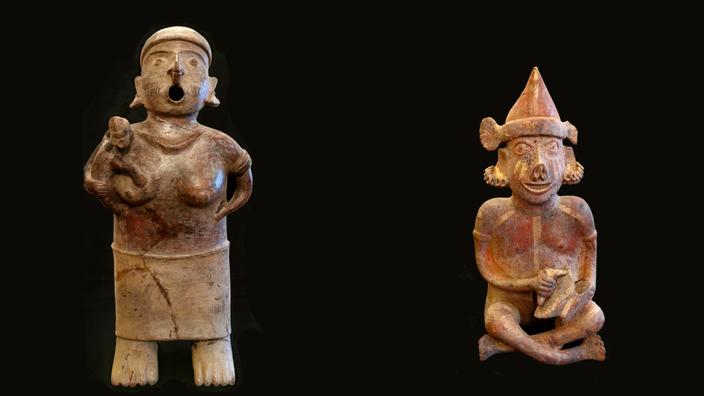Good sequence for the restitution of Mesoamerican heritage. The Mexican Embassy in France on Monday exhibited eighteen pre-Columbian art objects returned by collectors to the diplomatic representation. The brief Parisian demonstration of this fifteen ancient remains, organized before their return to Mexico, closes a bouncing autumn sequence. It was marked, in France as in the rest of the world, by several restitutions and media disputes concerning various collections of American heritage illegally entered the art market.
A movement always too timid and too dependent on the goodwill of collectors, regretted however in October Mexico, by mentioning
"transnational delinquency" to
which its heritage continues to be the object.
Read alsoMasterpiece of Mayan statuary, the feathered stele of Piedras Negras returned to Guatemala
However, each restitution remains despite everything a moment of real pride for Mexico. Among the returned objects, two magnificent anthropomorphic clay figurines, dating from the classical Mesoamerican period (2nd - 8th century AD), would certainly not have stood out in the most respected collections of pre-Columbian art. Carved in the so-called Ixtlán del Río style, named after the eponymous archaeological site in the state of Nayarit, in western Mexico, they represent a mother standing, carrying her child clinging to a breast, as well as a crouching man. with a mischievous smile, wearing a hat and some traces of polychromy.
The rest of the objects consist mainly of a variety of clay dishes - bowls, vases, pot - from the same Classical and Late Classical period, dated from the 2nd to the 10th centuries, as well as an Aztec tripod bowl. (13th-16th century).
Other fragments could not be precisely dated, although their pre-Columbian origin is beyond doubt.
Fragmented remains of a clay figurine representing a standing man.
Tumbas de Tiro style, it would originate, according to Mexican experts, from Comila, in the west of the country, where it would have been created, under the classical period (2nd-8th century AD).
Mexican Embassy in France / INAH
This collection of pre-Columbian objects was transmitted in two stages to the Mexican Embassy, during an anonymous donation of two figurines, on November 15, then on December 6, thanks to the initiative of Diana Filiu Chaparro, member from a family of collectors settled in France.
“The Mexican Embassy in France welcomes the fact that the activism of the Mexican government in favor of the defense and the recovery of its cultural heritage is reflected in the voluntary handing over of archaeological objects by individuals and wishes that more citizens are sensitive to this call ”
the Mexican representation said in a statement on Monday.
The imminent return of these objects comes a few weeks after the return by Germany of a collection of pre-Columbian objects in Mexico and Guatemala.
Read alsoMexico headlong against the pre-Columbian art dealers
Patrimonial bleeding
Under the leadership of its president Andrés Manuel López Obrador, Mexico has stepped up in recent years its action to combat the illicit trafficking of the country's pre-Columbian heritage. Very popular with the art market and collectors, Mesoamerican antiquities and other pre-Hispanic remains have long been the source of more or less organized looting of archaeological sites in Mexico and neighboring countries. And lead, consequently, to a slow, but inexorable hemorrhage of the heritage of the countries of Central America concerned by this endemic phenomenon. “
The cultural heritage of a country is not for sale. These goods are very important for Mexican culture and identity.
Ingrid Arriaga, in charge of exhibitions and teaching at the Cultural Institute of Mexico in France, reminded AFP on Monday.
On the other side of the Atlantic, the mobilization of institutions is not running out of steam, despite the scale of the task.
To date, more than 5,800 antiquities have reportedly been returned to Mexico since 2018, welcomes the Mexican government.
A figure promised to increase even more quickly, while President Lopez Obrador announced at the end of September the creation of a special unit of the Mexican National Guard responsible for the recovery of works of national heritage.
This organization should be inspired by the special and world-renowned Carabinieri unit in Italy, at the forefront of the hunt for illicit cultural property.
Read alsoThe Sales Council responds to the controversy over the sales of pre-Columbian objects
For the time being, countries wishing to recover the objects which they suspect of having been the object of looting and then of illegitimate trafficking face a legal wall. According to French law, it is indeed up to the countries interested in the possible return of objects to prove themselves, and on a case-by-case basis, that the documents in question have been obtained illegally. An operation that is often complex to implement, as it is "
difficult to trace parts, most of which were found and left Mexico at the beginning of the 20th century,
" Ingrid Arriag told AFP. The pieces exhibited Monday at the Mexican Embassy have thus been studied and authenticated by the National Institute of Anthropology and History (INAH), theMexican institution responsible for preserving and protecting the country's historical heritage.
Most of the objects claimed by Mexico and neighboring countries are, however, identified during their passage on the art market.
At the end of January, the Mexican Embassy demanded the cancellation of an auction organized by Christie's in Paris.
Despite the support of four other Latin American countries concerned, 136 pieces - including an exceptional Mayan ax - were sold on November 10, bringing in more than three million euros.
The subject, delicate, because holding the legal puzzle in France, was the subject of discussions between the Minister of Foreign Affairs, Jean-Yves Le Drian, visiting Mexico on Monday and Tuesday, and his counterparts.

